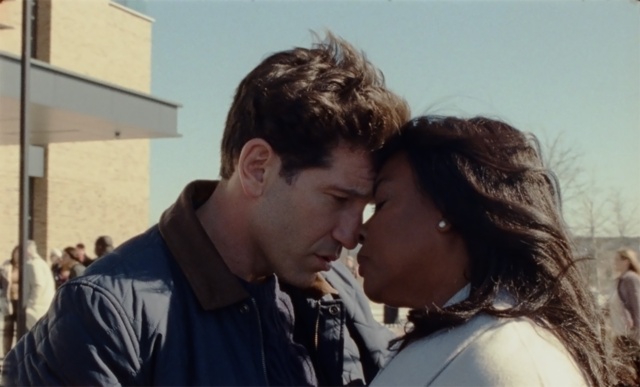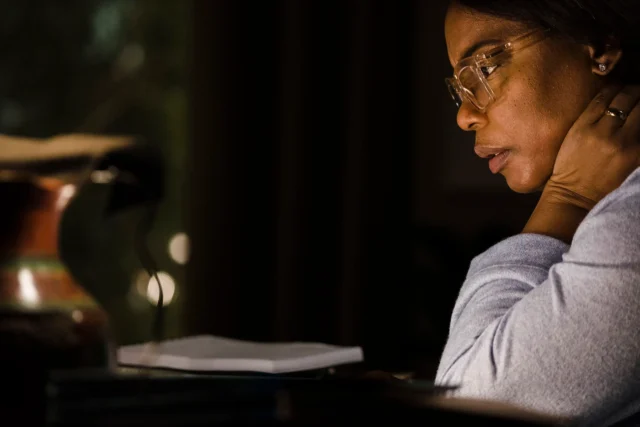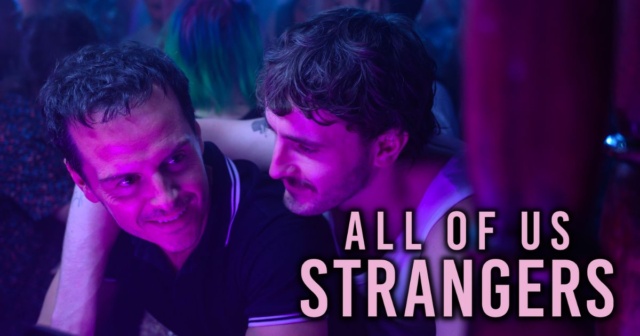Ava DuVernay’s ‘Origin’ is a Masterclass in Grief and Purpose

In a world that is inundated with film and television, some names in Hollywood stand out. From the moment you see their name attached to the project, you know exactly what you’re going to get. Ava DuVernay is one of those names. Her directorial debut might have been I Will Follow but it was with her work on Middle of Nowhere and Selma that people began to take notice. Since then, DuVernay’s name has been attached to many notable projects, such as 13th, A Wrinkle in Time, and DC’s Naomi. Her works explore topics that require people to think deeper and question the structure of our society. This trend continues with her latest film, Origin.
The story is based on the book Caste: The Origins of Our Discontents by Isabel Wilkerson. Origin not only explores the caste system in which our society is erected and how racism in the United States is just a pillar holding it up, but also the impact that loss has on one person. Starring as the author of the book is Aunjanue Ellis-Taylor who’s joined by Jon Bernthal, Niecy Nash-Betts, Finn Wittrock, Audra McDonald, Vera Farmiga, Nick Offerman, and Blair Underwood. While this film premiered back on September 6, 2023 at the Venice International Film Festival, it’s just now receiving a wide release in the US. It’s the perfect time to discuss and see DuVernay’s prolific work in Origin.
[Warning: spoilers and impressions from Origin are below!]
Turning loss into a mission in Origin
Ava DuVernay uses Origin and the source material written by Wilkerson to explore two very distinct topics, racism and grief. When this film opens, we join Ellis-Taylor’s characterization of Isabel in a work that many of us adults are too familiar with. It’s not long after the tragic death of Trayvon Martin, a case that is impossible to forget and frankly shouldn’t be forgotten. Martin’s death shocked the world, and Isabel is tasked with writing about it and the wider impact of racism across the United States.
Isabel isn’t interested in that at this time, rejecting the offer from her editor Amari (Blair Underwood) many times. He pressures her to listen to the recording of what happened the night that Martin was killed by George Zimmerman. The moment when he is fatally shot is haunting, sticking with her long after the recording stops. During this time, Isabel experiences loss as well, which changes her perspective quickly. Her husband, played by Jon Bernthal, drops dead one day in the couple’s bedroom, around the same time that she also loses her mother, Ruby (Emily Yancy).
Reeling from the tragedy and struggling to find her footing again, Isabel decides to channel her grief into something useful. Her mission is for all the Trayvon Martins out there, who died as a result of the broken system in which our world has been built. So begins her exploration of how society is divided by caste, which goes deeper than just race, religion, sexuality, etc.

This exploration to find the origin of hatred and segregation in the world takes her across the globe, as she looks for answers to better explain why social stratification exists based on which social group one is born in. Through her journey, Isabel meets people and uncovers stories that span decades, which provides some healing and a sense of closure to her trauma and experiences of being a person of color in America.
The positives and negatives of Origin
Origin is easily one of the most important films I’ve watched in recent years, but also one of the most difficult. Examining sensitive topics such as racism and the deaths that result from a caste system is never easy, and it shouldn’t be. There should always be a heaviness that resides in any film that chooses to talk about it, and audiences should feel that in every second of the film and long after they are done. Origin achieves this goal and does so wonderfully in a film that is as beautiful as it is devastating.
Ava DuVernay doesn’t shy away in Origin, nor does she pull her punches. Instead, the film is as raw as it can be. It rips open the life of Isabel and her mission to expose the broken system that is killing people of color. Origin utilizes flashbacks of history stitched throughout to explore caste systems throughout time, which adds to the realness of the narrative of the film. Together with Isabel’s narrative, this exploration is vibrant, but not always necessarily pleasant to watch. Again, this is intentional and makes Origin one of the deepest films of recent years.
The true beauty comes from her personal journey of loss, as the life Isabel lives within the fabric of the film isn’t easy. Not only does she experience loss on a global level as she looks into the caste system as a way to deal with deaths such as Trayvon Martin, which happen all too often, but personal loss. The death of her husband and mother creates a hole, in which Isabel could easily get lost in. Instead, she decides to channel her grief into something more. Perhaps that might not be the healthiest way to process our grief, but it seems to work for her.

Origin, being an intimate examination of both a global problem and Isabel’s life, can feel a little slow. You feel every minute of the two-hour and twenty-one-minute film. Each second of Origin is packed with emotion and focused on its message. This isn’t a popcorn flick that you can just turn on and lose yourself in a phone and still know what’s going on. It’s a human piece that is front and center and for a story like this, that is how it should be. Origin works because it’s raw and real, so embracing that aspect means taking the excitement with the downtime, as both are important to truly understanding these characters.
The cast of Origin is incredible, with so many notable stars amongst them. But this film would be nothing without the talented Aunjanue Ellis-Taylor. Ellis-Taylor breathes life into Origin in a career-topping performance. She embodies Isabel in a way that is beyond the realm of believable, becoming her in every second she’s on-screen. Ellis-Taylor bares her heart on the screen, bringing tears to my eyes more than a few times.
Joining her in the “making Brian cry” category is Niecy Nash-Betts, who plays Isabel’s cousin Marion. Throughout Origin, we watch Marion become increasingly ill and eventually pass away. She remains a pillar of strength for Isabel until her dying breath. Nash-Betts tends to veer toward more comedic roles, such as on Reno 911! and Claws, but between Origins and Monster: the Jeffrey Dahmer Story, she’s proven that her dramatic pieces are even more iconic. These two women carry this film, which is made easier by just how talented the entire cast is and the strong work they all put into Origin.
Final thoughts on Ava DuVernay’s Origin
I cannot stress enough how impactful Origin has been on me. I haven’t yet stopped thinking about it. From the writing to the direction, as well as the cast, Origin is a strong example of how to make a film. Ava DuVernay has provided a masterclass film on grief and how to find purpose after such an incredible loss.
This film should be on everyone’s radar and studied in schools across the globe. It touches on subjects that need to be talked about, even if it is difficult to do so. With a wider release, Origin is finally more accessible to everyone, so if it’s playing in a city near you, I implore you to watch it.
Origin is currently in theaters. Let us know on social media @mycosmiccircus or in The Cosmic Circus Discord if you plan to see this film and what you think of it.
Cosmic Circle Ep. 48: The Best Movies of 2023
All of Us Strangers is a Haunting Ode to Love, Family, and Queerness




